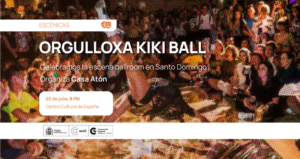Well, dear readers, my time in Santo Domingo has come to a close. 11 weeks ago, I arrived to a new country in a region of the world that I had not had the opportunity to travel before. I came with little expectations and lots of ideas of how my time could possibly go. At the beginning of the summer, 11 weeks in a new country felt something like a lifetime, like something that would change me, move me. Now, 11 weeks later, I feel grateful and happy to share that this experience has been everything I could have hoped it to be. This experience has, indeed, changed me for the better, at the risk of sounding cliché. This is not to say that everything was perfect, or color de rosa, as I’ve heard folks say here. Working on a global project has been anything but straightforward. Managing communication between two teams, one in Santo Domingo and one in North Carolina, in two languages, has been complicated and tiring at times, not to mention working across various technologies. I had to interrogate my expectations from previous workplaces, where these barriers did not exist. But, as someone who wants to work globally, especially in other Spanish-speaking countries, this experience has been powerful in solidifying this interest.
As you can imagine, it is difficult to summarize, to communicate concisely, all the things that have happened over 11 weeks, both inside and outside of the workplace. So, instead of attempting to cover everything, I want to share about one experience attending a Kiki ball at the Spanish Cultural Center in Santo Domingo. This was my very first time attending a ball, actually. Balls, one of the defining features of ballroom culture, are historically Black and Latinx spaces where queer and trans folks perform to compete and win prizes. The 1990 documentary Paris is Burning is one of the most recognized films exploring ballroom culture in 1980s New York City. Having never been to a ball, when I saw the Kiki ball promoted on the Cultural Center’s social media, I automatically saved the date in my calendar.

At the Kiki ball, as with other balls, participants walked in different categories, which included face, runway, and voguing. This particular event was open to all participants, experienced performers or not, which isn’t always the case with other balls. Participants were then scored by a panel of judges on their performance in accordance with the category. What then unfolded, in my eyes, was a celebration of ballroom culture, of trans identity, of queerness, of community, creativity, and perseverance. I wish I had taken more photos – photos would describe the energy in the room much better than my words could. I walked away that night feeling full, grateful, and joyous to have been able to share that space with other community members. It is events like these that remind me why I choose to work with queer and trans communities, again and again and again. There, inside the walls of the Cultural Center, the hosts worked hard to create a space where there is no judgement, only celebration, of our diverse identities, a sharp contrast to what many experience on the streets, in their workplaces, in their homes. It is not lost on me the irony of this event being held at the Spanish Cultural Center, given the legacy of Spain’s colonization of the Dominican Republic. How would queer and trans communities be held and understood in the Dominican Republic, if the Spanish had never colonized the island? The legacy of colonization, alongside homophobia and transphobia, is what we must reckon with in our public health practice. After all, current public health trends, just like the significant HIV incidence among trans women in Santo Domingo, are often a result of what came before us.
